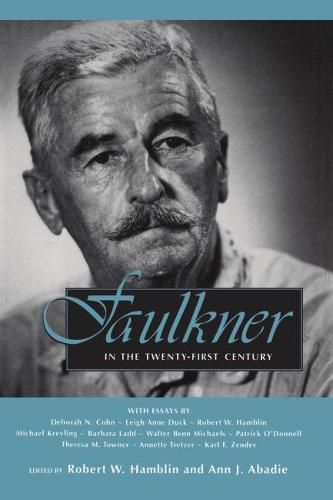Readings Newsletter
Become a Readings Member to make your shopping experience even easier.
Sign in or sign up for free!
You’re not far away from qualifying for FREE standard shipping within Australia
You’ve qualified for FREE standard shipping within Australia
The cart is loading…






This title is printed to order. This book may have been self-published. If so, we cannot guarantee the quality of the content. In the main most books will have gone through the editing process however some may not. We therefore suggest that you be aware of this before ordering this book. If in doubt check either the author or publisher’s details as we are unable to accept any returns unless they are faulty. Please contact us if you have any questions.
Contributions by Deborah N. Cohn, Leigh Anne Duck, Robert W. Hamblin, Michael Kreyling, Barbara Ladd, Walter Benn Michaels, Patrick O'Donnell, Theresa M. Towner, Annette Trefzer, and Karl F. Zender.
Faulkner in the Twenty-First Century presents the thoughts of ten noted Faulkner scholars who spoke at the twenty-seventh annual Faulkner and Yoknapatawpha Conference at the University of Mississippi. Theresa M. Towner attacks the traditional classification of Faulkner’s works as major and minor and argues that this causes the neglect of other significant works and characters. Michael Kreyling uses photographs of Faulkner to analyze the interrelationships of Faulkner’s texts with the politics and culture of Mississippi.
Barbara Ladd and Deborah Cohn invoke the relevance of Faulkner’s works to the other South, postcolonial Latin America. Also, approaching Faulkner from a postcolonial perspective, Annette Trefzer looks at his contradictory treatment of Native Americans.Within the tragic fates of such characters as Quentin Compson, Gail Hightower, and Rosa Coldfield, Leigh Ann Duck finds an inability to cope with painful memories. Patrick O'Donnell examines the use of the future tense and Faulkner’s growing skepticism of history as a linear progression. To postmodern critics who denigrate The Fire and the Hearth, Karl F. Zender offers a rebuttal. Walter Benn Michaels contends that in Faulkner’s South, and indeed the United States as a whole, the question of racial identification tends to overpower all other issues. Faulkner’s recurring interest in frontier life and values inspires Robert W. Hamblin’s piece.
$9.00 standard shipping within Australia
FREE standard shipping within Australia for orders over $100.00
Express & International shipping calculated at checkout
This title is printed to order. This book may have been self-published. If so, we cannot guarantee the quality of the content. In the main most books will have gone through the editing process however some may not. We therefore suggest that you be aware of this before ordering this book. If in doubt check either the author or publisher’s details as we are unable to accept any returns unless they are faulty. Please contact us if you have any questions.
Contributions by Deborah N. Cohn, Leigh Anne Duck, Robert W. Hamblin, Michael Kreyling, Barbara Ladd, Walter Benn Michaels, Patrick O'Donnell, Theresa M. Towner, Annette Trefzer, and Karl F. Zender.
Faulkner in the Twenty-First Century presents the thoughts of ten noted Faulkner scholars who spoke at the twenty-seventh annual Faulkner and Yoknapatawpha Conference at the University of Mississippi. Theresa M. Towner attacks the traditional classification of Faulkner’s works as major and minor and argues that this causes the neglect of other significant works and characters. Michael Kreyling uses photographs of Faulkner to analyze the interrelationships of Faulkner’s texts with the politics and culture of Mississippi.
Barbara Ladd and Deborah Cohn invoke the relevance of Faulkner’s works to the other South, postcolonial Latin America. Also, approaching Faulkner from a postcolonial perspective, Annette Trefzer looks at his contradictory treatment of Native Americans.Within the tragic fates of such characters as Quentin Compson, Gail Hightower, and Rosa Coldfield, Leigh Ann Duck finds an inability to cope with painful memories. Patrick O'Donnell examines the use of the future tense and Faulkner’s growing skepticism of history as a linear progression. To postmodern critics who denigrate The Fire and the Hearth, Karl F. Zender offers a rebuttal. Walter Benn Michaels contends that in Faulkner’s South, and indeed the United States as a whole, the question of racial identification tends to overpower all other issues. Faulkner’s recurring interest in frontier life and values inspires Robert W. Hamblin’s piece.